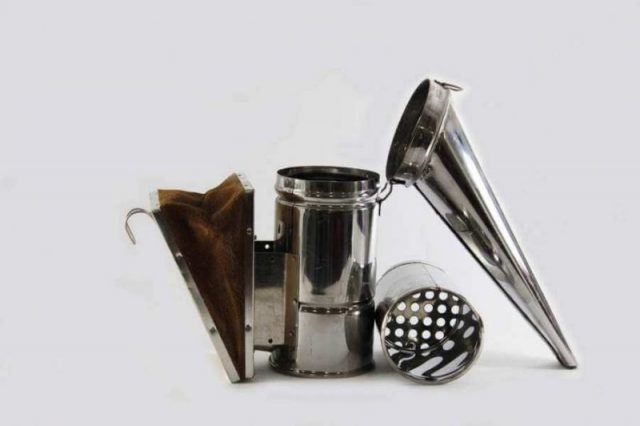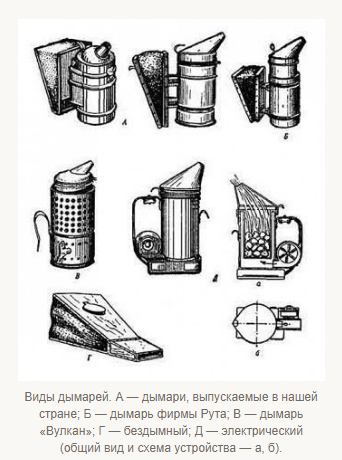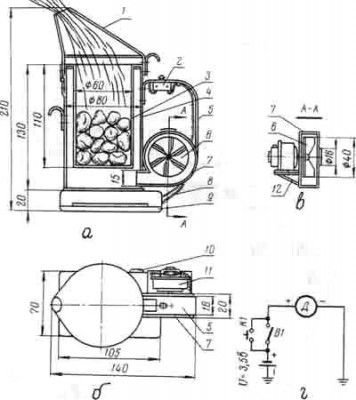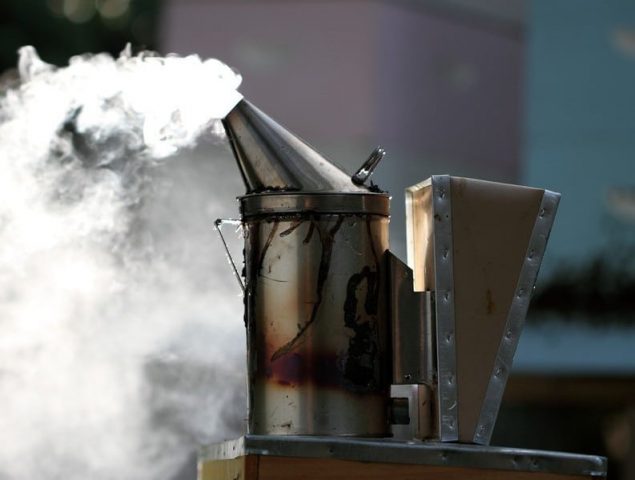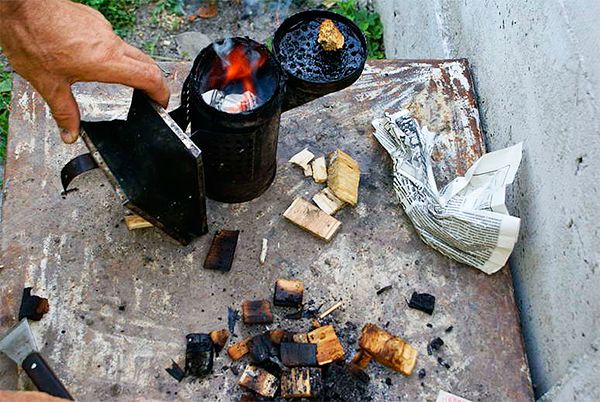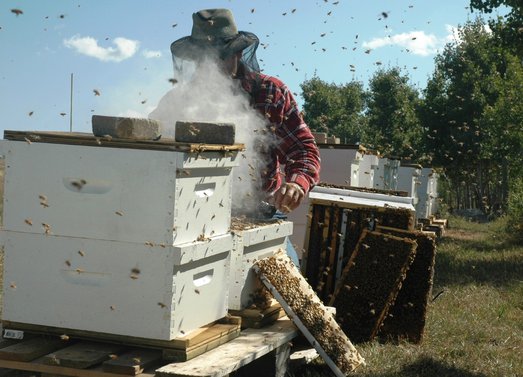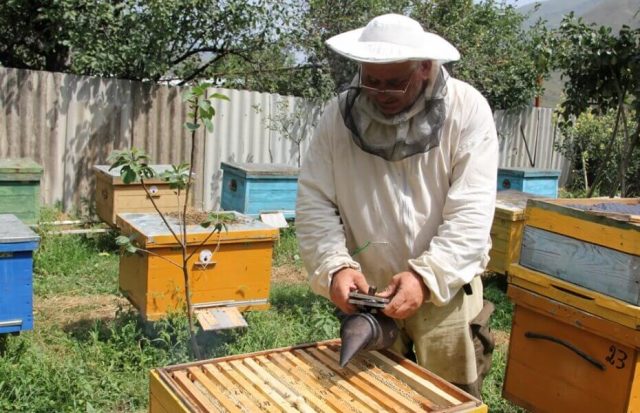Content
Beekeepers use a smoker for bees during the maintenance of the hives. The smoke plumes calm aggressive insects without harming them. The design of the smoker is so simple that you can make it yourself. Improved models are purchased at specialized retail outlets.
What is a smoker and why is it needed
In fact, a smoker is a metal container, usually in the form of a cylinder with a spout. A device of the simplest design has three components:
- Double layer metal body. The best material of manufacture is considered to be stainless steel.
- Cap in the form of a tapered spout. Depending on the model, the element is removable or tilts to one side from the body.
- The bellows blow air into the hull to keep the fuel burning.
The double body of the appliance forms a firebox. The inner second element is a similar part, only of a smaller size and with a mesh bottom. This is where the fuel smolders. Due to the lack of contact of the main body with heat, the outer surface of the smoker does not get hot.
The lid with a long spout is convenient for supplying smoke to the frames and into the entrance. The bellows are a mechanical pump that supplies air to the inside of the firebox. With each pumping, the heat swells, a thick portion of smoke comes out of the spout.
The calming effect is due to the special effect of smoke on insects. The bees are afraid of him. When smoke appears, they collect a full goiter of honey. The heavy load prevents the bee from bending. The insect becomes clumsy, quietly moves along the frames and the body of the hive. The beekeeper at this time inspects the frames, service, pumping honey. Smoke cannot guarantee 100% protection from bees. A few insects will sting the beekeeper anyway, but the main swarm will not interfere with the work.
Varieties of smokers
The principle of operation of smokers of different models is the same. The device differs, which affects the usability. The following types are available to beekeepers:
- An ordinary beekeeper smoker is the simplest, most reliable, widespread, but requires constant manual air pumping. Such work does not always suit beekeepers when it is required to serve large families of bees. The factory-made model consists of a body, a hinged lid with a spout, a loading cup with a grid bottom. The furs are made of two plywood elements joined by leather. There is a compression spring between the plywood. Product weight is about 1 kg.
- The model named "Ruta" is identical in design to a simple apiary smoke. The difference is the country of issue. The model is common in the USA and European countries.
- Vulcan is very popular with beekeepers. Compared to previous models, the device is self-acting. A winding mechanism is installed on the bottom of the case, which drives the fan. The rotating propeller blades inflates the glowing fuel. Additionally, the "Volcano" is equipped with an adjusting lever. Left position - maximum smoke, right position - minimum smoke.
- An electric beekeeper smoker is similarly powered by a fan. The device does not need furs. The fan is powered by a battery installed inside the additional compartment.
The volcano and the electric model are the most popular among beekeepers who keep a large number of hives. The devices work almost independently, you just need to add fuel on time.
Is it possible to make a smoker for bees with your own hands?
If there is a desire or need, smoke with your own hands, it is better to start assembling with the simplest design. Manufacturing procedure:
- For the case, you will need two cylinders, preferably made of stainless steel. Parts must be of different sizes. Diameter of the main body approx. 100 mm, height approx. 250 mm. The sleeve can be cut from a thin-walled pipe and welded with a plug on one side to make a bottom. The second workpiece is made according to a similar principle, only of a smaller size. The smaller cylinder should fit inside the larger glass like a folding toy nesting doll.
- The bottom and side walls of the smaller cylinder are perforated with a drill. 3-4 legs with a height of 30 mm are welded from below, so that a gap forms between the bottoms - a blower.
- The cover of the bee appliance is bent out of thin steel in the shape of a cone. The diameter of the lower part is selected so that the cap fits over the body. A fine-mesh steel mesh is fixed inside the lid. The element will play the role of a spark extinguisher that protects the bees from the burns of the blown fuel.
- A hole is drilled on the lower part of the main body in the area of the blower. The fasteners of the bellows are fixed with rivets.
- The furs themselves for the beekeeping smoker are made from two rectangular pieces of plywood. A spring is placed between the blanks at the top. From below, the plywood converges. You should get a V-shaped piece. Between themselves they are fastened with leather, shooting the stapler to the plywood with staples. An air hole is cut out in the lower part of the bellows and this part is attached to the prepared fasteners on the body.
The ready-made smoker is tried in action. If everything works, you can go to the bees.
A homemade electric smoker is made according to a similar principle. Only the furs are replaced with a snail with a fan. You can find a toy blower in the store. Instead of a handle, fix a motor from a children's toy. Place the propeller on the rotor shaft. The outlet nozzle of the blower is attached to the place where the opening for the bellows is prepared. In addition to the smoker, a plastic box is fixed, which serves as a case for batteries.
Which bee smoker is better
It is impossible to give a concrete answer to the question about the advantage of this or that smoker. Beekeepers are principled people. Everyone has their own habits, prejudices, designs. For ease of use in the first place is the ordinary beekeeper smoker.
From a scientific point of view, the electric smoker is not only productive, but also gentle towards bees. A constantly running fan is capable of fanning the raw fuel. The smoke, together with the steam, comes out of the spout almost cold, without burning the bees.
"Volcano" is also not bad, but it requires a periodic establishment of the key, which is not always convenient. On the other hand, the battery also runs out and has to be replaced.
How to properly light a smoker
It is not difficult to light any smoker of any design. The main thing is to prepare good fuel on the eve of visiting the bees. The sequence of ignition of the electric device for fumigating bees:
- Remove the ash collector and the smoke tube. A bunch of splinters is set on fire with a lighter and placed in the loading hole. A fan is turned on to fan the fire at low speed.
- After full ignition, add a small amount of fuel. When thick smoke comes out, the bunker is loaded with fuel to the top. Put on the tube.
- Dry urotropine is placed in the ash collector, set on fire. The fan continues to run at low speed.
A regular beekeeper smoker is even easier to light. The inner glass is filled with dry fuel. A piece of crumpled paper is set on fire. The fire is put on the fuel, covered with a lid with a spout and intensely inflated with furs. Ignition will occur from the jolts of air. The fuel will begin to smolder, giving off thick smoke.
In the video, a quick ignition of a smoker for fumigating bees:
How to fill a bee smoker
Bees don't like acrid smoke. With this in mind, it is necessary to select fuel. Plain wood, sawdust, dry straw will not work. Fuel should not burn. The sparks will burn the bees. It is optimal to douse the hive with low temperature smoke. Rotten wood is a common fuel. Beekeepers collect it on old stumps, fallen trees. The dust gives off a soft, non-hot smoke that is comfortable for bees.
The downside of rotten wood is fast burning. Frequent refueling of the smoker while serving the bees is not profitable. A dry mushroom is capable of replacing dust. A tinder fungus grows on a tree in the form of a solid growth. The smoke is released from the mushroom much longer and is just as comfortable for the bees.
Oak bark is another fuel. You can even take a little damp. The bark smolders for a long time, does not ignite, the smoke is comfortable for bees.
Terms of use
When fumigating bees, they work with a smoker in compliance with the rules:
- only those frames with bees that need to be removed from the hive for maintenance are fumigated with smoke;
- after opening the lid of the hive, you cannot immediately blow up smoke, let the bees calm down;
- during fumigation of bees, smoke should not be blown into the nest;
- the smoker is removed as far as possible from bees and honeycombs so that the hot smoke does not harm them;
- if the smoker is temporarily not needed, it is put on its side, then inflated again;
- at the end of the service, the bees in the smoke close all the holes, and the fuel extinguishes without oxygen.
The body of the smoker is not hot, but warm enough for bees and combs. Even an extinct device is placed further from the hive, as it cools down for a long time.
Conclusion
The bee smoker must always be kept in good condition. In hot dry weather, a defective appliance may cause a fire.
